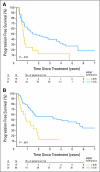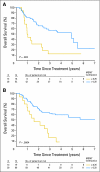MGMT promoter methylation is prognostic but not predictive for outcome to adjuvant PCV chemotherapy in anaplastic oligodendroglial tumors: a report from EORTC Brain Tumor Group Study 26951
- PMID: 19901104
- PMCID: PMC2793037
- DOI: 10.1200/JCO.2009.24.1034
MGMT promoter methylation is prognostic but not predictive for outcome to adjuvant PCV chemotherapy in anaplastic oligodendroglial tumors: a report from EORTC Brain Tumor Group Study 26951
Abstract
Purpose: O6-methylguanine-methyltransferase (MGMT) promoter methylation has been shown to predict survival of patients with glioblastomas if temozolomide is added to radiotherapy (RT). It is unknown if MGMT promoter methylation is also predictive to outcome to RT followed by adjuvant procarbazine, lomustine, and vincristine (PCV) chemotherapy in patients with anaplastic oligodendroglial tumors (AOT).
Patients and methods: In the European Organisation for the Research and Treatment of Cancer study 26951, 368 patients with AOT were randomly assigned to either RT alone or to RT followed by adjuvant PCV. From 165 patients of this study, formalin-fixed, paraffin-embedded tumor tissue was available for MGMT promoter methylation analysis. This was investigated with methylation specific multiplex ligation-dependent probe amplification.
Results: In 152 cases, an MGMT result was obtained, in 121 (80%) cases MGMT promoter methylation was observed. Methylation strongly correlated with combined loss of chromosome 1p and 19q loss (P = .00043). In multivariate analysis, MGMT promoter methylation, 1p/19q codeletion, tumor necrosis, and extent of resection were independent prognostic factors. The prognostic significance of MGMT promoter methylation was equally strong in the RT arm and the RT/PCV arm for both progression-free survival and overall survival. In tumors diagnosed at central pathology review as glioblastoma, no prognostic effect of MGMT promoter methylation was observed.
Conclusion: In this study, on patients with AOT MGMT promoter methylation was of prognostic significance and did not have predictive significance for outcome to adjuvant PCV chemotherapy. The biologic effect of MGMT promoter methylation or pathogenetic features associated with MGMT promoter methylation may be different for AOT compared with glioblastoma.
Conflict of interest statement
Authors' disclosures of potential conflicts of interest and author contributions are found at the end of this article.
Figures


Comment in
-
Anaplastic glioma: how to prognosticate outcome and choose a treatment strategy. [corrected].J Clin Oncol. 2009 Dec 10;27(35):5861-2. doi: 10.1200/JCO.2009.24.5985. Epub 2009 Nov 9. J Clin Oncol. 2009. PMID: 19901101 No abstract available.
References
-
- Gerson SL. MGMT: Its role in cancer etiology and cancer therapeutics. Nature Rev. 2004;4:296–307. - PubMed
-
- Jaeckle KA, Eyre HJ, Townsend JJ, et al. Correlation of tumor O6 methylguanine-DNA methyltransferase levels with survival of malignant astrocytoma patients treated with bis-chloroethylnitrosourea: A Southwest Oncology Group study. J Clin Oncol. 1999;16:3310–3315. - PubMed
-
- Esteller M, Garcia-Foncillas J, Andion E, et al. Inactivation of the DNA-repair gene MGMT and the clinical response of gliomas to alkylating agents. N Engl J Med. 2000;343:1350–1354. - PubMed
-
- Stupp R, Mason WP, van den Bent MJ, et al. Radiotherapy plus concomitant and adjuvant temozolomide for glioblastoma. N Engl J Med. 2005;352:987–996. - PubMed
-
- Hegi ME, Diserens A-C, Gorlia T, et al. MGMT gene silencing and benefit from temozolomide in glioblastoma. N Engl J Med. 2005;352:997–1003. - PubMed
Publication types
MeSH terms
Substances
Supplementary concepts
Grants and funding
LinkOut - more resources
Full Text Sources
Medical
Research Materials

